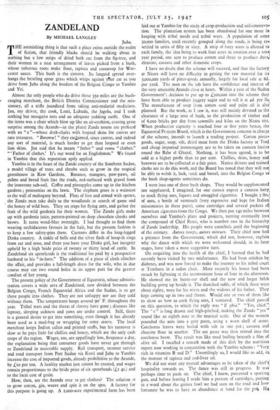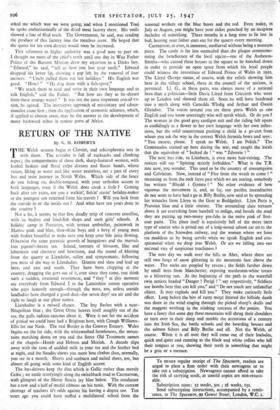ZANDELAND
By MICHAEL LANGLEY Juba.
THE astonishing thing is that such a place exists outside the realm of fiction, that friendly blacks should be walking about in nothing but a few strips of dried bark cut from the fig-tree, and their women in a neat arrangement of leaves picked from a bush, whose tuberous roots make flour, tapioca and cassareep for Wor- cester sauce. This bush is the cassava. Its languid spread over- hangs the bristling spear grass which whips against y15-ur car as you drive from Juba along the borders of the Belgian Congo to Yambio and Yei.
Almost the only people who do drive those 35o miles are the bush- ▪ ranging merchant, the British District Commissioner and the mis-
sionary, all a trifle jaundiced from taking anti-malarial medicines. Jan, my driver, the cook, Loati, Lukuda, the fagelu, and I took nothing but mosquito nets and an adequate trekking outfit. One of the items was a chair which blew up like an air-cushion, causing great surprise among the Azande—in the plural Zande nouns are prefixed with an " a "—whose deck-chairs with leopard skins for canvas are rare treasures. "Baremu! " they exc.:aimed, since canvas, and indeed any sort of material, is much harder to get than leopard or even lion skins. Jan said that ba meant " father "-and remu " clothes." "`Father of clothes.' It's our word for an Englishman." We found in Yambio that this reputation aptly applied.
Yambio is in the heart of the Zande country of the Southern Sudan, a model village of trees and shrubs such as grow in the tropical greenhouse in Kew Gardens. Bananas, mangoes, paw-paws, oil palms and bread fruit line the roads, red-surfaced with gravel from the ironstone sub-soil. Coffee and pineapples come up in the kitchen gardens ; poinsettias on the lawn. The elephant grass is a wainscot to the wall of mahogany beyond. Fleet of foot and armed with spears, the Zande, men take daily to the woodlands in search of game and the ,honey of wild bees. They set traps for flying ants, and gather the fruit of the wild gardenia for their women. The Zande girls make up with gardenia juice, pattern-painted on deep chocolate cheeks and brows. It turns woad-blue overnight. I had thought to find them wearing orchidaceous favours in the hair, but the present fashion is to keep a few safety-pins there. Customs differ in the long-legged Dinka country. A tinkle of bells and the silver flash of hoop-1a rings from ear and nose, and there you have your Dinka girl, her integrity upheld by a high bride price of twenty or thirty head of cattle. In Zandeland six spearheads is the traditional fee paid by a prospective husband to his "in-laws." The addition, of a piece of cloth clinches the affair, and provides a full-length dress for the wife, who in due course may cut two round holes in its upper part for the greater comfort of her young.
The present policy of the Government of Equatoria, whose adminis- tration covers a wide area of' Zandeland, now divided between the Belgian Congo, French Equatorial Africa and the Sudan, is to get these people into clothes. They are not unhappy nor are they cold without them. The temperature keeps around 90° F. throughout the year. Tribal wars and the threat of slavery have gone ; diseases like leprosy, sleeping sickness and yaws are under control. Still, there is a general desire to get into something, even though it has already been used as a mail-bag or wrapping for army stores. The local merchant keeps Indian calico and printed stuffs, but his turnover is slow as he pays little for chillies and honey, which are the only cash crops of the region. Wages, too, are appallingly low, fivepence a day, the explanation being that consumer goods have never got through to Zandeland in noticeable supply. Rail transport, steamer service and road transport from Port Sudan via Kosti and Juba to Yambio increase the cost of imported goods, already prohibitive to the Azande, by £m per ton. A healthy market just cannot be created, and wages remain proportionate to the bride price of six spearheads (£r 4s.) and
to the local cost of grain. • How, then, are the Azande ever to get clothes? The solution is to grow cotton, gin, weave and spin it on the spot. A factory for this purpose is going up. A 2,000-acre experimental farm has been
laid out at Yambio for the study of crop-production and soil-conserva.,
don. The plantation system has been abandoned for one more in keeping with tribal needs and tribal ways. A population of some 30,000 families, until recently grouped along the roads, is being re.p settled in units of fifty or sixty. A strip of forty acres is allotted to each family, the idea being to work four acres in rotation over a teni year period, one acre to produce cotton and three to produce dural eleusine, cassava and other domestic crops.
I have no doubt that the scheme will succeed, and that the factory, at Nzara will have no difficulty in getting the raw material for its 3,000,000 yards of piece-goods annually, largely for local sale at 8d.
per yard. The men on the job have the confidence and interest of the very amenable Azande close at heart. Within a year of the Sudan Government's decision to put up to £5oo,000 into the scheme they have been able to produce jaggery sugar and to sell it at 4d. per lb, The manufacture of soap from cotton seed and palm oil is also planned. But the work, as I saw it, was still mainly devoted to the clearance of a large area of bush, to the production of timber and of 6,000 bricks per day from sawmills and kilns on the Nzara site.' When productive capacity is reached four or five years hence, the Equatorial Projects Board, which is the Government concern in charge of the scheme, intends to launch a trading project. Cotton piece+ goods, sugar, soap, salt, dried meat from the Dinka factory at Toni and cheap imported ironmongery are to be taken on canteen lorries round the Bahr el Ghazal. Nothing, it has been agreed, is to ba sold at a higher profit than to per cent. Chillies, skins, honey and beeswax are to be collected at a fair price. Native drivers and trained clerks are to do this work, and the Board has noted that they will not be able to welsh it, lock, stock and barrel, into the Belgian Congo as the bush shop-agents sometimes do.
I went into one of these bush shops. They would be supplemented' not supplanted, I imagined, for one cannot expect a canteen lorry
to stock flying ants, liquors and smuggled cigarettes. I bought 2 lbs.
of ants, a bottle of vermouth (very expensive and kept for Italian missionaries in these parts), some cartridges and several packets of American cigarettes from the Congo. We then put 140 miles between.' ourselves and Yambio's plans and projects, turning eventually into the compound of Chief Renzi, who is number two in the hierarchy
of Zande leadership. His people were cannibals .until the beginning of the century. Autres temps, autres mbeurs. Their chief now had a pittance from the Government, which did not, however, explain why the dance with which we were welcomed should, in its later stages, have taken a most suggestive turn.
On enquiring into the health of the chief, I learned that he had recently been visited by two misfortunes. He had been stricken byl
diabetes, and was now forced to make the journey to his tribal court at Tembura in a sedan chair. More recently his house had been struck by lightning at the inconvenient hour of four in the afternoon.
He showed me its burnt-out shell and the new and larger brick
building going up beside it. The thatched tukls, of which there were about eighty, were for his wives and the widows of his father. They
kept coming up in two and threes. Would one or two of them !ike
to show us how to cook flying ants, I ventured. The chief passed on this question, to which the reply was "E gbia." " Yes, chief."' The "e " is long drawn and high-pitched, making the Zande " yes
sound like an eighth note in the musical scale. One of the women pounded the ants into a grey paste, using a worn shell of stone.
Corchorus leaves were boiled with salt in one pot ; cassava and eleusine flour in another. The ant paste was then stirred into the corchorus brew. The result was like mud boiling beneath a film of olive oil. I recalled a remark made of this dish by the nutrition expert now working in conjunction with the Yambio scheme: " Very, rich in vitamins B and D." Unsettlingly so, I would like to add, in4 the manner of tapioca and cod-liver oil. We did not want any mutual advantages to be taken of the chieri, hospitality towards us. The dance was still in progress. It was
perhaps time to push on. The chief, I knew, possessed a sporting gun, and before leaving I made him a present of cartridges, putting in a word about the guinea fowl we had seen on the road and how fortunate he was to have an abundance at hand for the VOCE HQ
asked me which way we were going, and when I mentioned Tonj he spoke enthusiastically of the dried meat factory there. His smile showed a line of filed teeth. The Government, he said, was sending the produce of this factory into the meatless areas. He hoped that the quota for his own district would soon be increased.
This reference to higher authority was a good note to part on. I thought no more of the chief's teeth until one day in Watt Father Polato of the Bussere Mission drew my attention to a Dinka boy. " Edward," he said, " tell us how you lost your teeth." Edward dropped his lower lip, showing a gap left by the removal of four incisors. " Uncle pulled them out last holidays." His English was good. " How? " "He dug them with a fish-spear."
" We teach them to read and write in their own language and to talk English," said the Father. " But how are they to be •drawn from these strange ways? " It was not the most important considxra- non, he agreed. The instructive approach of missionary and educa- tionalist came first ; then the application of economic schemes, which, if applied to chosen areas, may be the answer to the development of many backward tribes in remote parts of Africa.



































 Previous page
Previous page